..
| First County Visit: | Friday 20th March 1992 |
| Competition: | Barclays League Division 3 – (Tier 3) |
| Result: | Shrewsbury Town 0 – 1 Stockport County |
| Attendance: | 3,186 |
| Away Trip: | 57 |
| Away Day: | 229 |
| County Line-up | 1 Neil Edwards; 2 Andy Thorpe (14 Neil Matthews); 3 Jim Carstairs; 4 David Frain (12 Darren Knowles); 5 Tony Barras; 6 Alan Finley; 7 Jim Gannon; 8 Peter Ward; 9 Paul Wheeler; 10 Lee Todd; 11 Andy Preece |
| Scorer: | Paul Wheeler |
| Manager: | Danny Bergara |
| County Visits: | 6 |
..
IT WAS THE SADDEST DAY OF MY LIFE: DANNY BERGARA..
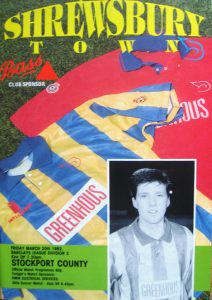
Unique name, and a unique ground in my view. Absolutely loved it and what a sorry day it was on New Years Day 2007 when I walked out of Gay Meadow for what turned out to be the last time.
..
The next visit to watch us play the Shrews was to the New Meadow, and what a soulless place that is. But more about that when I get to Away Trip 114.
Shrewsbury is one of those places beloved of tourists. But Gay Meadow was different than many other grounds in tourist destinations that we went to in the years up to the explosion of new stadia, and the exponential growth in the profits of the manufacturers of breeze block.
Even the most charitable would hesitate to say that Sealand Road; the Manor Ground and the Abbey Stadium were part of the must see places. They were miles away from the places that the day trippers saw. Yet Gay Meadow, was as good as in the town centre, and was an integral component of the town itself. It’s proximity is reflected in its name. It was in the late middle ages a place where the good folk of Shrewsbury went to enjoy themselves. It was a place for fun and games with its nomenclature reflecting the older definition of the term. Essentially it was a public park, but fifteenth century style.
The aerial view, (below), shows it closely bounded by the River Severn; a railway line which was close to the town centre terminus for the Worcester and Hereford line; and the Wakeman Technical School. I suppose that, irrespective of any other Health and Safety considerations, the potential for expanding the stadium was next to nil, and to be fair the proximity of the Severn made it more than susceptible to floods. But for me its disappearance has been a sad loss.
..
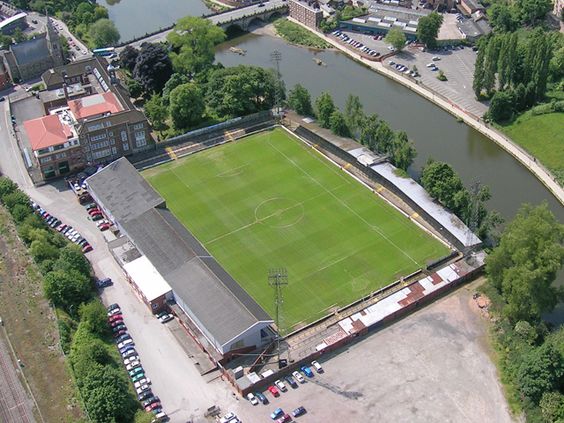
Gay Meadow, bounded by the river; railway and school.
A town centre stadium, the number of which reduces by the year, or so it seems.
..
My first visit there was for a Friday night game in March 1992. We stood 4th, some 6 points behind leaders Stoke, but with a game in hand. But the push for promotion had stuttered. In the games since the beginning of February we had won only 4 so a win was vital. Shrewsbury were too close to the southern end of the table for their own comfort.
Jeff and I opted for the Main Stand. Essentially it was 3 covers joined into one, but afforded a decent view with a bit of height giving a good perspective. To our left was the Wakeman End, a small uncovered terrace, severely limited due to its proximity to the school. Opposite was the Riverside terrace. Not much deeper than the old Midland Road Stand at Valley Parade, it was covered in corrugated iron and propped up by a whole swathe of posts. An archetypal construction beloved of lower league grounds.
..
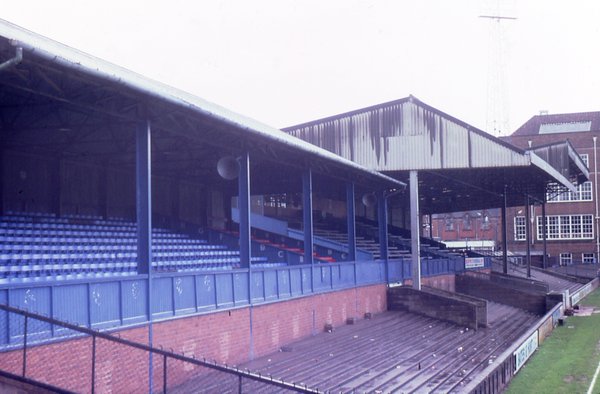
The Main Stand – three different covers. On the occasions I used the stand we were always directed to the part nearest from where the photo was taken.
..
It backed onto the river bank and of course provides the familiar tale of the man in a coracle, who went to retrieved the errant clearances from the torrent into which they had plunged. It’s one of the whimsical anecdotes which frame the history of grounds which may not have appeared on TV each week, but were still part of the rich tapestry of English football.
..
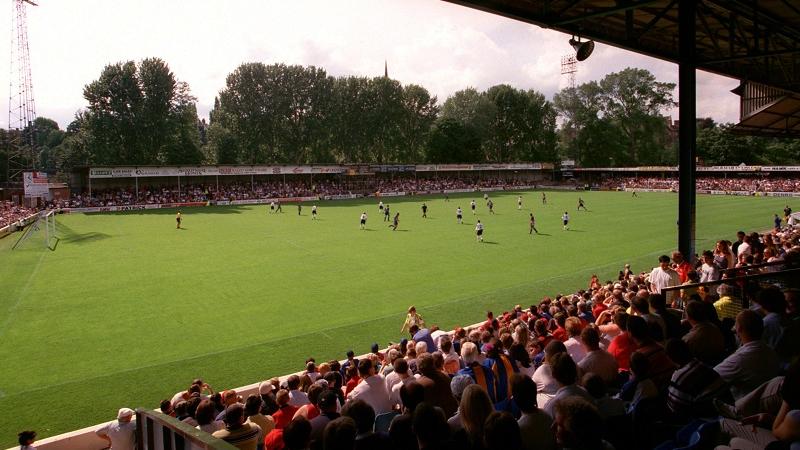
View across the ground from the Main Stand to the Riverside terrace. Standing for visitors was on the Railway End, to the right of the picture
..
We won the game 1-0, and Paul Wheeler, who was an integral part of the squad, if not a regular member of the starting XI, throughout 1991/92, got the winner. His last start for County was the Autoglass Final against Stoke a couple of months later. He came on as sub the following week in the Play-Off final against Peterborough, and then after a gap of six months had a final showing as a sub against Bradford in January 1993.
Some two years later Jeff and I journeyed again. It was a surreal atmosphere that day as we stood on the Railway End. (Pictured below is the view that we had that afternoon looking down the pitch to the Wakeman End). It was fairly rudimentary with a rather ramshackle cover at the rear. But it definitely provided a platform for much discussion that afternoon. But take things back 6 years almost to the day. In the intervening period we had played 350 games. There had been 156 wins; 86 draws; 108 losses. We were 14th in Tier 3 having risen from 14th in the tier below. There had been one promotion; three ultimately unsuccessful trips to the play-offs and four Wembley appearances.
..
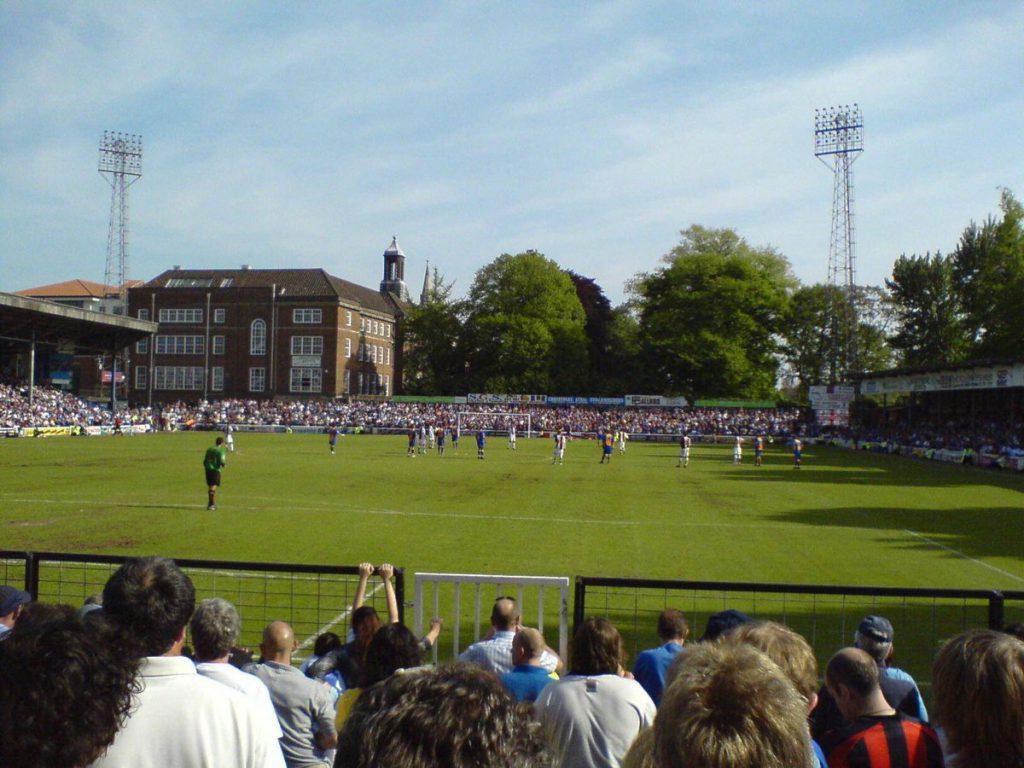
Looking down the pitch from the Railway End. In the distance is the Wakeman End, (with the school which gave it the name just behind)
..
Those six years encompassed the reign of Danny Bergara in the EP hot- seat. He had taken us from being perennial strugglers to a team and Club which had received wider acclaim. There was no reason at all to suspect his tenure was going to come to an abrupt end. We had won at Plymouth on the Tuesday night before the Shrewsbury game. The following afternoon I was at a reserve game at EP and saw Bergara chatting to the smattering of fans who showed up at those type of fixtures. Things seemed fine. But within 48 hours news emerged that Bergara had been fired. It left County fans open mouthed. What had happened? It couldn’t be football based, given his record, and sure enough, as the acrimonious details emerged it was a case of Chairman v Manager and in those kind of circumstances there is only one winner.
Let Chris Green in his book “The Sack Race: The Story of Football’s Gaffers” take up the story: I’ve corrected a couple of factual errors (in red)
..
Bergara became British football’s first foreign manager when he took charge of Rochdale. It was short-lived, but he soon had another chance, this time at struggling Stockport, perennial Fourth Division re-election applicants. They were going nowhere, (well, certainly not upwards), had never really been anywhere, anchored to the bottom division for 21, mainly desperate, seasons. Until Danny Bergara rolled into town.
In his six years in charge, Bergara won promotion to Division Three, (then renamed Division Two), and they went to Wembley four times, (twice in the Autoglass Trophy, twice in the play-off finals). He made the club millions of pounds in the transfer market by what Danny calls ‘polishing diamonds’, developing his own young players, or spotting underachievers, improving them and selling them on. His side would form the backbone of the Stockport team that would, two years after Bergara was sacked in March 1995, go on to play in the First Division – dizzy, unimaginable heights. Stockport in the First Division, it beggared belief. They made the quarter finals of the FA Cup too (†)
(†) Not true – the best we did was the 5th round against Tottenham in 2001. Chris Green also fails to mention the League Cup semi-final.
‘I would say that we made two-and-a-half to three million pounds profit’ says Bergara. His role (sic), call of players includes Andy Preece, signed for £15,000, sold for £350,000.; Paul Williams, who cost nothing, sold for £250,000, and Kevin Francis, bought for £55,000, transferred for £800,000. Others moved after Bergara left: Alun Armstrong (for £1.6 million), goal-keeper Paul Jones, (†),and forward, (††), Tony Dinning. ‘It was a magnificent period’ recalls Bergara. ‘If someone would have told me that would happen when I arrived in England I wouldn’t have believed it. The way I had to go, it was the saddest day of my life’.
(†) – Jones wasn’t signed by Bergara but by Dave Jones in the summer of 1996
(††) – Dinning was a midfielder
So what caused Bergara to be sacked? A row over a £64 expense claim.
Bergara, who lived in Sheffield, had a cheap and cheerful arrangement to lodge at a terraced house opposite Stockport’s ground, Edgeley Park, a few nights a week. He had an expenses allowance of £50 a week, which Bergara claims he never reached. He even bought, and cooked, his own food to keep the costs down. Even though Bergara was making millions of pounds for the Club, this small allowance was taken away.
A subsequent employment tribunal recalls the events. In March 1995, Stockport County’s chairman Brendan Elwood sought to take Bergara’s meagre allowance off him. Bergara disagreed, but Elwood told a subsequent board meeting, in Bergara’s absence, that the manager had agreed to this new arrangement. When Bergara submitted his claim for £64 on 29 March, (the day after the win at Plymouth), he was refused payment. Bergara, in language hardly unfamiliar to the football industry,was verbally abusive to the club’s chief executive, David Coxon, and called the club’s finance director David Jolley and chairman Brendan Elwood ‘bastards’ for withholding his expenses. He repeated these remarks at a subsequent meeting with his deputies Dave Jones and John Sainty.
The tribunal heard that Bergara went to a dinner at a local hotel that evening, attended by Jolley and Elwood and other Stockport County board members. He met the club’s vice chairman, Grahame white, and described Jolley and Elwood as a pair of ‘fucking gangsters’. At the conclusion of the dinner, in the hotel foyer, Elwood swore at Bergara and sought to strike him twice across the face and told him ‘not to bother coming into work tomorrow as he no longer had a job’. Jolley, who had intervened, later became an aggressor, poking Bergara in the chest and giving him what was described to the tribunal as a ‘Sheffield volley’, a tirade of swearing. He told Bergara to come to a meeting in his office the next day, where he would ‘tear up his contract and shove it up his arse’.
Not surprisingly, Bergara did not accept this invitation and at a board meeting later that day, where their interpretation of the previous nights’ events had been presented by Elwood and Jolley to the rest of the board members, Bergara was dismissed. They said he had attacked them, not vice versa. The tribunal noted that the Stockport chairman, Brendan Elwood, had lied to his own board members by saying that Bergara had agreed to having his expenses withdrawn and by presenting a false version of events at the hotel. The tribunal found that Bergara had been unfairly dismissed and ‘was not satisfied that the respondents [the Club] had a genuine belief that the applicant [Bergara] was guilty of misconduct warranting dismissal based upon reasonable grounds. The evidence … showed the allegations which were ranged against the applicant … to be misconceived and inaccurate’
‘This was an employer who had treated this manager with a complete lack of frankness and in a disingenuous way …. For whatever reason Mr Elwood and Mr Jolley wished to terminate Mr Bergara’s contract’
..
And whilst Chris Green’s analysis may have some small factual errors, and is clearly done on the basis of Bergara’s side of the story, the thrust of it, and in particular the direct quotes from the tribunal cannot be gainsaid. I always look at the last sentence, ‘For whatever reason Mr Elwood and Mr Jolley wished to terminate Mr Bergara’s contract’. That to me is the nub of the issue. They may have decided that a change was necessary and that Bergara had taken us as far as he could. They may have just wanted rid for whatever reason. That will probably never be uncovered.
What I do know, from many years of experience of managing a large organisation, is that parting company with someone has to be very carefully managed in order to avoid unnecessary trips to tribunals. If Elwood and Jolley had decided that a parting of the ways was necessary then the way that they did it was frankly amateurish and laughable. There’s lots of people who credit Elwood with the County renaissance in the 90’s. I’m one of those but equally I’m not a slavish adherent to his cause.
Never was, particularly after the research I did for a piece in The Tea Party which examined the accounts after the ‘annus mirablis’ of 1996/97. He cracked on to be a sharp businessman, and I suppose that was the case when you’re dealing with student lets in Sheffield, but the extent of his business nous was seen when Brian Kennedy did him up like a kipper when he eventually disposed of his interest in County. Sadly for the Hatters followers it was the Club that was an even bigger kipper in the sorry episode that unfolded.
..
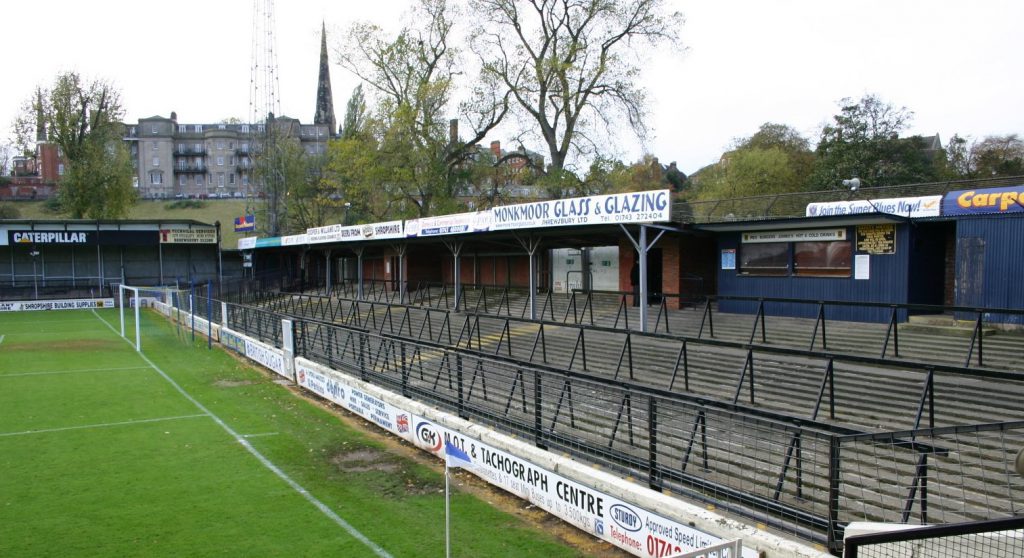
The Railway End at The Gay Meadow – the sparsity of cover could leave for an uncomfortable afternoon on a rainy day
..
Anyway, back to Gay Meadow. The diversion in my account to address the Bergara dismissal was vital. We turned up that day, and the atmosphere was indeed surreal. There were opinions in the pub beforehand which varied from support for the dismissal, (Danny’s time was up; time for a change etc etc), to sheer bemusement. Dave Jones, (Bergara’s assistant), had been put in charge. There were mixed emotions about that as well. We managed a draw, (Deiniol Graham getting his second goal of the week – the only two he notched in a brief County career). It left us in mid table, miles adrift of the play-off places. The rest of the season was now about evaluating Jones’ impact. As it turned out we won 3, drew 1 and lost the other 2 games, finishing 11th.
But whatever the case, there can be little argument that the afternoon at Gay Meadow was a milestone. It saw the advent of a manager, in Dave Jones, who was to give long standing County followers the best single season that they have ever seen. There can be no argument about that.
April 2020
..
There is some interesting archive footage of Gay Meadow – filmed in 1979
..
VISITS
..
| Day | Date | Competition | Tier / Round | Opponents | Res | F | A | Crowd | Away Day |
| Fri | 20/03/92 | Barclays League Division 3 | Tier 3 | Shrewsbury Town | W | 1 | 0 | 3,186 | 229 |
| Sat | 01/04/95 | Endsleigh League Division 2 | Tier 3 | Shrewsbury Town | D | 1 | 1 | 3,655 | 298 |
| Sat | 23/09/95 | Endsleigh League Division 2 | Tier 3 | Shrewsbury Town | W | 2 | 1 | 2,588 | 307 |
| Sat | 23/11/96 | Nationwide Football League – Division 2 | Tier 3 | Shrewsbury Town | L | 2 | 3 | 2,865 | 336 |
| Sat | 15/10/05 | Coca-Cola Football League – League 2 | Tier 4 | Shrewsbury Town | D | 2 | 2 | 4,316 | 538 |
| Mon | 01/01/07 | Coca-Cola Football League – League 2 | Tier 4 | Shrewsbury Town | L | 2 | 4 | 4,569 | 569 |
..
ON MY JOURNEY WITH COUNTY AROUND 180 GROUNDS
..
Previously – CRAVEN COTTAGE Next stop – MOSS ROSE

Recent Comments